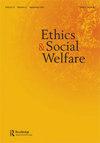尊严工作的日常伦理:在紧缩措施和福利耻辱时代,社会工作者如何促进服务使用者的尊严
IF 0.9
Q4 SOCIAL WORK
引用次数: 3
摘要
社会工作专业致力于承认人类固有的尊严,这反映在全球和国家的道德准则中。文章通过发展“尊严工作”的概念,展示了这种承诺作为日常伦理的一部分所隐含的含义。尊严工作是社会工作者为提高服务使用者的尊严而进行的一项持续努力的道德活动。荷兰专业人士收集的社会工作者的叙述显示,他们这样做主要是为了对抗福利耻辱。福利耻辱目前是对尊严的最大威胁,因为它将依赖福利安排和专业帮助的人定义为“不值得”,质疑他们作为一个人的价值。社会工作者的尊严工作有三种策略:肯定、平等和包容。通过这些实践,他们协商了自给自足的规范,在荷兰的背景下占主导地位,并试图反对客户不值得和毫无价值的想法和感觉。他们的做法暴露了“耻辱力量”的作用,因为社会工作者别无选择,只能每天与福利耻辱联系在一起。分析表明,伦理与政治是交织在一起的。在紧缩和福利耻辱的背景下研究尊严工作,揭示了其他看似普通的日常行为在道德和政治上都具有重要意义。本文章由计算机程序翻译,如有差异,请以英文原文为准。
Everyday Ethics of Dignity Work: What Social Workers Do to Promote the Dignity of Service-users in Times of Austerity Measures and Welfare Stigma
ABSTRACT The social work profession is committed to recognising the inherent dignity of humanity, as reflected in global and national ethical codes. The article shows what this commitment implies as a part of everyday ethics by developing the concept ‘dignity work’. Dignity work is an ongoing effortful moral activity social workers perform to promote the dignity of service-users. Social workers’ narratives, collected with professionals in the Netherlands, revealed that they do this mainly to counter welfare stigma. Welfare stigma currently forms the biggest threat to dignity as it defines people dependent on welfare arrangements and professional help as ‘undeserving’, questioning their worth as a person. Social workers perform three strategies of dignity work: affirming, equalising and including. With these practices they negotiate the self-sufficiency norm, dominant in the Dutch context, and try to counter ideas and feelings of undeservingness and worthlessness of clients. Their practices lay bare the working of ‘stigma power’ as social workers have no choice but to relate to welfare stigma daily. The analysis shows that the ethical is intertwined with the political. Studying dignity work in the context of austerity and welfare stigma reveals that otherwise seemingly ordinary everyday acts are morally and politically significant.
求助全文
通过发布文献求助,成功后即可免费获取论文全文。
去求助
来源期刊

Ethics and Social Welfare
SOCIAL WORK-
CiteScore
1.60
自引率
20.00%
发文量
36
期刊介绍:
Ethics and Social Welfare publishes articles of a critical and reflective nature concerned with the ethical issues surrounding social welfare practice and policy. It has a particular focus on social work (including practice with individuals, families and small groups), social care, youth and community work and related professions. The aim of the journal is to encourage dialogue and debate across social, intercultural and international boundaries on the serious ethical issues relating to professional interventions into social life. Through this we hope to contribute towards deepening understandings and further ethical practice in the field of social welfare. The journal welcomes material in a variety of formats, including high quality peer-reviewed academic papers, reflections, debates and commentaries on policy and practice, book reviews and review articles. We actively encourage a diverse range of contributions from academic and field practitioners, voluntary workers, service users, carers and people bringing the perspectives of oppressed groups. Contributions might include reports on research studies on the influence of values and ethics in social welfare practice, education and organisational structures, theoretical papers discussing the evolution of social welfare values and ethics, linked to contemporary philosophical, social and ethical thought, accounts of ethical issues, problems and dilemmas in practice, and reflections on the ethics and values of policy and organisational development. The journal aims for the highest standards in its published material. All material submitted to the journal is subject to a process of assessment and evaluation through the Editors and through peer review.
 求助内容:
求助内容: 应助结果提醒方式:
应助结果提醒方式:


